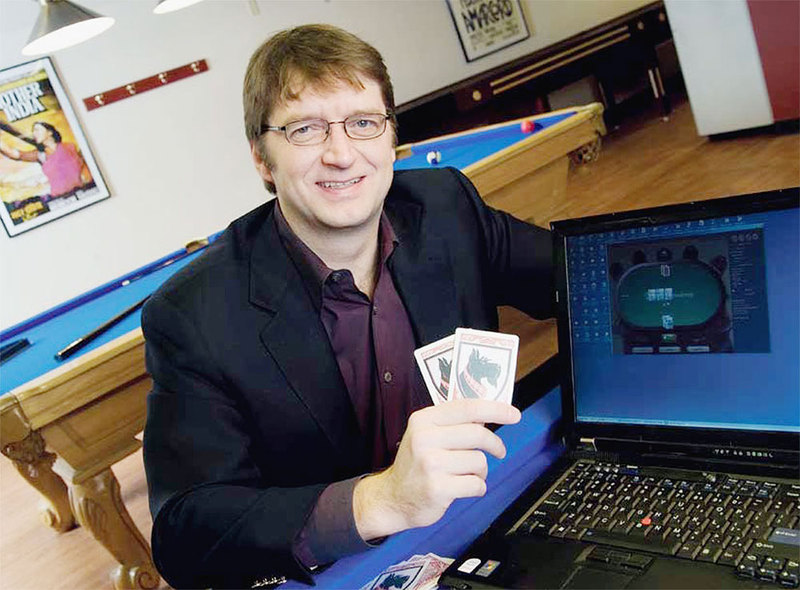






Poker Bot Crushes Humans In Historic MatchMachine Wins More Than 14 Big Blinds Per 100 Hands |
|
|
 Monday was another losing day for the human team, but the bleeding was finally stopped.
Monday was another losing day for the human team, but the bleeding was finally stopped.
After the completion of the 120,000 hands against Carnegie Mellon University’s poker machine Libratus, the poker pro team was down 1,776,250 chips. The chips have no cash value, but the poker pros are splitting a $200,000 purse for a grueling battle against the best poker playing robot ever developed.
“We’re not paying,” Jason Les, one of the poker pros to play Libratus, joked at a press conference Tuesday. “I showed up thinking there was a good chance we would lose, but I thought it would be a lot closer. It’s truly a monumental day in AI.”
Les lost 880,097 to the bot, which was worst on the team. Jimmy Chou was in the hole 522,857, and Daniel McAulay lost by 277,657. Dong Kim, who was in the black for a good portion of the 20-day contest, finished down just 85,649 chips.
“We really got a beat-down,” McAulay said.
The 1.7 million chips was about 17,000 big blinds, or about 14 big blinds per 100 hands. That was nearly 90 buy-ins, as every hand of the contest began with the human player and the machine sitting with 20,000 chips (200 big blinds).
The event, dubbed “Brains vs. AI”, was held at Rivers Casino in Pittsburgh.
Libratus was just the latest poker bot from CMU computer scientist Tuomas Sandholm. Libratus was designed by Sandholm and his PhD. student Noam Brown.
“Heads-up no-limit hold’em had been elusive,” Sandholm said of the challenges behind beating top human players in the game. “This is a landmark in AI game play.”
 “The poker pros are real sportsmen,” Sandholm said at the press conference. After every night of play, the team met to discuss strategies and try to find leaks in Libratus’ game. Unfortunately, they weren’t able to find much.
“The poker pros are real sportsmen,” Sandholm said at the press conference. After every night of play, the team met to discuss strategies and try to find leaks in Libratus’ game. Unfortunately, they weren’t able to find much.
Libratus was also fine-tuned after sessions, which led to the human team feeling like the bot was getting better every day. “It learns from us and the weakness disappears the next day,” Chou said during the contest.
Each night after a session, the Pittsburgh Supercomputing Center’s Bridges computer performed computations to sharpen Libratus’ strategy. On Monday, Brown posted an academic paper on the complex game theory behind Libratus.
An earlier version of Libratus called Claudico was defeated by a different group of poker pros in the spring of 2015. However, CMU called the 7,300 big blinds a “statistical tie.”
Sandholm called this year’s result “highly statistically significant.”
 “Since the earliest days of AI research, beating top human players has been a powerful measure of progress in the field,” Sandholm said. “That was achieved with chess in 1997, with Jeopardy! in 2009 and with the board game Go just last year. Poker poses a far more difficult challenge than these games, as it requires a machine to make extremely complicated decisions based on incomplete information while contending with bluffs, slow play and other ploys.”
“Since the earliest days of AI research, beating top human players has been a powerful measure of progress in the field,” Sandholm said. “That was achieved with chess in 1997, with Jeopardy! in 2009 and with the board game Go just last year. Poker poses a far more difficult challenge than these games, as it requires a machine to make extremely complicated decisions based on incomplete information while contending with bluffs, slow play and other ploys.”
While Libratus was able to win in heads-up no-limit hold’em with 200 big blind stacks, the bot wouldn’t be able to handle additional players at the table, and the match could have gone very differently if the stacks were much deeper than 200 big blinds.
Libratus used a very balanced and powerful (literally what Libratus means in Latin) river over-bet strategy with both bluffs and value bets that kept the humans generally confused.
Because Libratus was designed specifically for the Brains vs. AI battle, and the fact that it cost millions of dollars to develop and run, online poker players shouldn’t fear that AI like Libratus will threaten the integrity of internet games anytime soon. Online poker companies are also highly sophisticated at detecting robot players. It’s also worth mentioning that Libratus would sometimes go deep into the tank on later streets, something that wouldn’t be possible at a real internet poker table.
